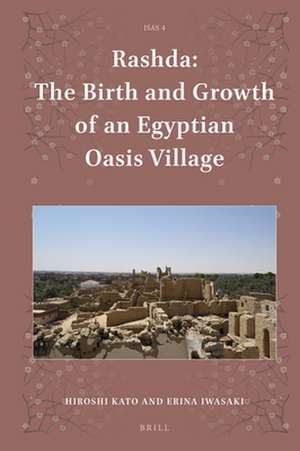Rashda: The Birth and Growth of an Egyptian Oasis Village: Islamic Area Studies, cartea 4
Autor Hiroshi Kato, Erina Iwasakien Limba Engleză Hardback – 8 iun 2016
Preț: 617.95 lei
Preț vechi: 753.60 lei
-18% Nou
Puncte Express: 927
Preț estimativ în valută:
118.26€ • 123.01$ • 97.63£
118.26€ • 123.01$ • 97.63£
Carte indisponibilă temporar
Doresc să fiu notificat când acest titlu va fi disponibil:
Se trimite...
Preluare comenzi: 021 569.72.76
Specificații
ISBN-13: 9789004316171
ISBN-10: 9004316175
Dimensiuni: 155 x 235 mm
Greutate: 0.61 kg
Editura: Brill
Colecția Brill
Seria Islamic Area Studies
ISBN-10: 9004316175
Dimensiuni: 155 x 235 mm
Greutate: 0.61 kg
Editura: Brill
Colecția Brill
Seria Islamic Area Studies
Cuprins
Preface
Transliteration of Arabic
Introduction
Scope of the Research
Methodology and Data
Part 1 Dakhla Oasis
1 Islands of the Blessed
Islands in the Sand
Dakhla Oasis in the Administration of Modern Egypt
Column ① Egypt from the Periphery
2 Conditions of Natural and Human Resources
Climate and Hydrogeology
Demographic Trends
Water, Population and Land Use
3 Family Structure
Analytical Framework
Household Structures in the Nationwide Surveys
Household Structures and Family in 19 Villages
Family Structures in Four Survey Villages
4 Social Economy
Social and Economic Structures in Egypt
Regional Categorization of Social and Economic Structures
Viewing 19 Villages using Basic Indicators
Personalities of the 19 Villages
Part 2 Rashda in History
5 Formation of Rashda
Rashda at the End of the 18th Century
Rashda as a Field
Rashda as a Settlement
Landscape of “Old” Rashda
6 Development of Rashda
Independence of Rashda from Qalamun
Formation of the “New” Rashda
Expansion of the Village Space
Column ② Rashda Village Cemetery
7 A Society Based on Water
Uncertainty of Water Supply
State Intervention in Water Affairs
A Society Controlled by Water
A Society Based on Water Sharing
Part 3 Rashda Today
8 Rashda as a Community
Location and Administration
Residential Space in Rashda
Public Services in Rashda
Services Provided by the Villagers
9 Family Structure in Rashda
Household Structure in 1861
Household and Family Structure in Rashda in 2005
Families in Rashda across 150 Years
Column ③ Family Tree
10 Wells and Irrigation
Wells and Springs
Development of Wells
Water Distribution
Column ④ Bir Majnun District
11 Agriculture and Household Economies
Agriculture in Household Economies
Crop and Livestock
Market in Household Economies
Part 4 Community in Well No. 3 Irrigation District
12 Irrigation District
Categories of Irrigation District
Bir Sheykh (Local Well) Irrigation District
Investment Well No. 51 District
Saada (Surface Spring) District
13 Society of Well No. 3 Irrigation District
History of Well No. 3 Irrigation District
Irrigation Management System
Crop Rotation System
14 Social Relations of Well No. 3 Irrigation District
An Irrigation District Formed by Government Policy
Family as an Institution of Landholding and Management
Agricultural Co-operation between Farmers
Conclusion
Three Factors for Analysis
A Society Embedded in Water Management
List of Illustrations
Select Bibliography
Explanatory Glossary
Transliteration of Arabic
Introduction
Scope of the Research
Methodology and Data
Part 1 Dakhla Oasis
1 Islands of the Blessed
Islands in the Sand
Dakhla Oasis in the Administration of Modern Egypt
Column ① Egypt from the Periphery
2 Conditions of Natural and Human Resources
Climate and Hydrogeology
Demographic Trends
Water, Population and Land Use
3 Family Structure
Analytical Framework
Household Structures in the Nationwide Surveys
Household Structures and Family in 19 Villages
Family Structures in Four Survey Villages
4 Social Economy
Social and Economic Structures in Egypt
Regional Categorization of Social and Economic Structures
Viewing 19 Villages using Basic Indicators
Personalities of the 19 Villages
Part 2 Rashda in History
5 Formation of Rashda
Rashda at the End of the 18th Century
Rashda as a Field
Rashda as a Settlement
Landscape of “Old” Rashda
6 Development of Rashda
Independence of Rashda from Qalamun
Formation of the “New” Rashda
Expansion of the Village Space
Column ② Rashda Village Cemetery
7 A Society Based on Water
Uncertainty of Water Supply
State Intervention in Water Affairs
A Society Controlled by Water
A Society Based on Water Sharing
Part 3 Rashda Today
8 Rashda as a Community
Location and Administration
Residential Space in Rashda
Public Services in Rashda
Services Provided by the Villagers
9 Family Structure in Rashda
Household Structure in 1861
Household and Family Structure in Rashda in 2005
Families in Rashda across 150 Years
Column ③ Family Tree
10 Wells and Irrigation
Wells and Springs
Development of Wells
Water Distribution
Column ④ Bir Majnun District
11 Agriculture and Household Economies
Agriculture in Household Economies
Crop and Livestock
Market in Household Economies
Part 4 Community in Well No. 3 Irrigation District
12 Irrigation District
Categories of Irrigation District
Bir Sheykh (Local Well) Irrigation District
Investment Well No. 51 District
Saada (Surface Spring) District
13 Society of Well No. 3 Irrigation District
History of Well No. 3 Irrigation District
Irrigation Management System
Crop Rotation System
14 Social Relations of Well No. 3 Irrigation District
An Irrigation District Formed by Government Policy
Family as an Institution of Landholding and Management
Agricultural Co-operation between Farmers
Conclusion
Three Factors for Analysis
A Society Embedded in Water Management
List of Illustrations
Select Bibliography
Explanatory Glossary
Notă biografică
Hiroshi Kato, Ph.D.(1983) is Professor Emeritus of Hitotsubashi University. He specializes in the social and economic history of Arab countries, especially Egypt, and has published many books and articles in Japanese, including A Scandal of Village Abu Senita: Village Society in Judicial Documents, 1997. His most recent article is ""Personality" of Economic Development in the Delta Region of Egypt in Modern Times: Focus on Buhaira Governorate", (with Erina Iwasaki), 2016.
Erina Iwasaki, Ph.D.(2006) is Professor at Sophia University. She specializes in Middle Eastern and North African studies, and has published many articles, including "Income Distribution in Rural Egypt - A Three Village Case", 2015.
Erina Iwasaki, Ph.D.(2006) is Professor at Sophia University. She specializes in Middle Eastern and North African studies, and has published many articles, including "Income Distribution in Rural Egypt - A Three Village Case", 2015.



